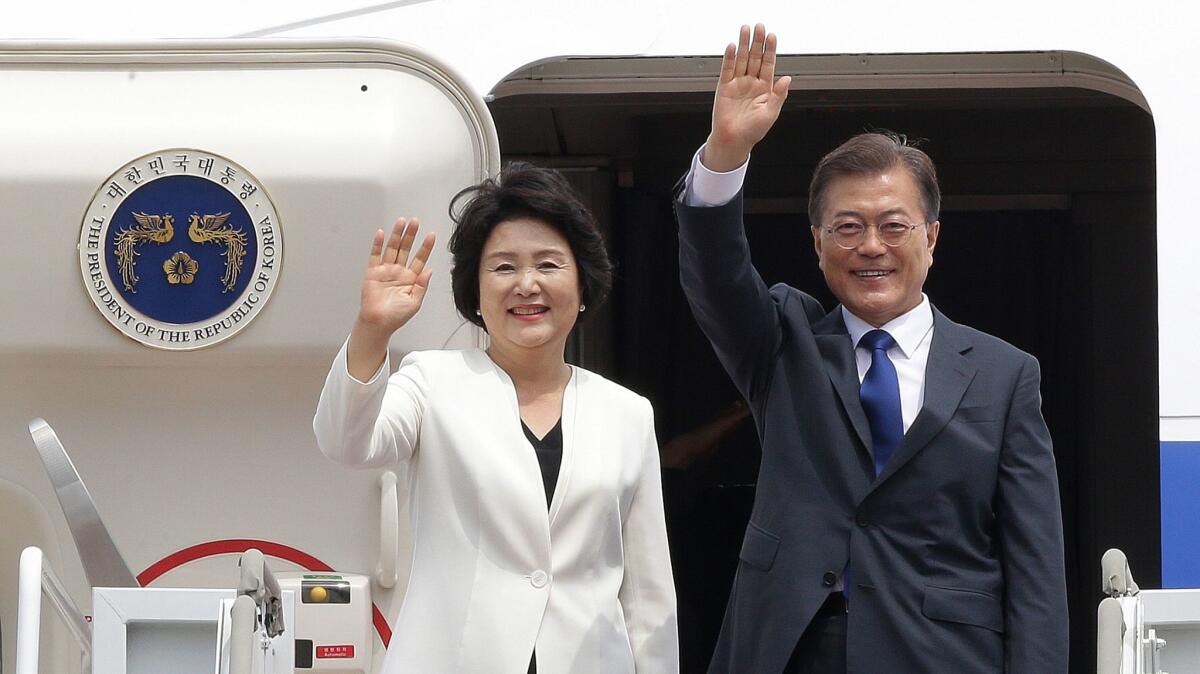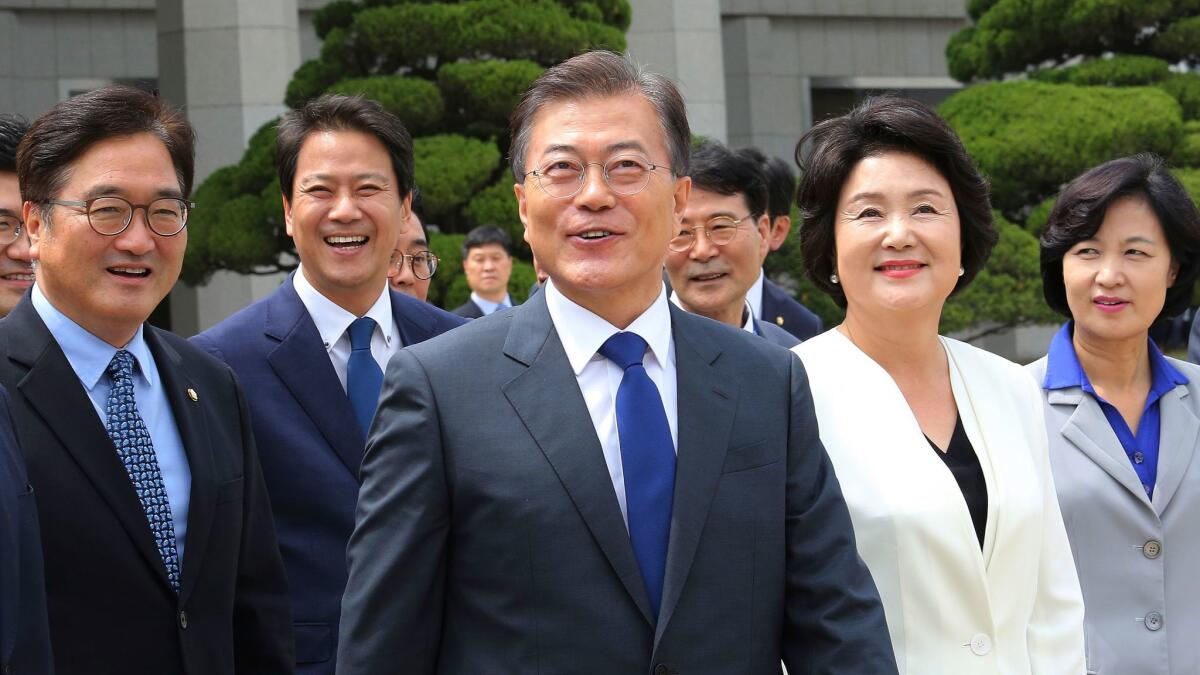South Korea’s president to meet President Trump this week amid grave concerns over North Korea

- Share via
Reporting from SEOUL — South Korea’s newly elected president is in Washington this week, hoping to build a relationship with President Trump and pave the way for cooperation on North Korea’s advancing nuclear threat.
Moon Jae-in, a liberal whose election could alter his country’s posture toward both the totalitarian nation and the United States, has a series of meetings with Trump and his top aides Thursday and Friday.
Expectations for any policy declarations about North Korea or other thorny issues confronting the two countries remain low, however.
Moon took office only last month in a snap election following the ouster of disgraced former President Park Geun-hye, and both leaders are still hiring staff and forming their positions on key issues.
“Both sides are going to try to get in and out of there without having to talk about too much substance,” said David Kang, a professor at USC who heads its Korean Studies Institute. “They’re not really set up to do policy yet.”
So the focus when they meet for a family dinner Thursday and a more formal summit Friday could be an effort to build trust. Both sides likely also want to avoid any awkward exchanges — as Trump has had with other leaders on the world stage — that might strain relations or raise questions about a relationship that’s crucial to security in northeast Asia.
The subtext of any discussion between the two leaders, though, will include several complicated issues crucial to both nations, which have been allies since the Korean War ended. With American protection, South Korea rose from poverty after the war, democratized in the 1980s and is now Asia’s fourth-largest economy.
Chief among those concerns is how to cooperate on North Korea, which has tested several ballistic missiles this year in violation of United Nations sanctions. Its leader, Kim Jong Un, said earlier in January that his nation is making progress toward a nuclear-armed missile that can reach the United States.
Trump’s new policy calls for “maximum pressure” on the regime through sanctions and dialogue only after North Korea ends the nuclear program. Moon has advocated more dialogue and cross-border exchanges with the North to help with the nuclear issue, leading some to suspect he might at times disagree with Trump administration strategy.
Moon was a former chief aide to the late Roh Moo-hyun, the last South Korean president to advocate for a “Sunshine Policy” of greater ties between the two Koreas, which are still technically at war. It led to high-level summits and economic ventures but ultimately fizzled when more conservative leaders were elected in South Korea.
Still, few experts expect any serious fissures in the decades-old alliance, which top Trump officials describe as “ironclad.” Moon’s aides this week have also emphasized trust and cooperation.
The two countries also have pending issues raised during both leaders’ election campaigns, including a trade agreement, a controversial American anti-missile system recently installed in South Korea over Chinese objections — and the status and cost of United States troops stationed here.

Moon’s administration, which is bringing dozens of South Korean business leaders to develop economic ties, has downplayed policy expectations ahead of the trip. His aides noted that former ambassadors with American experience advised the new president to avoid too much policy discussion. They said, though, that Moon should ask Trump to attend the Winter Olympics in PyeongChang, South Korea, in February.
“We will build friendship between the leaders through candid and honest conversation and provide a foundation for the alliance to develop,” Moon’s spokesman Park Soo-hyun said.
With so much at stake, others aren’t convinced the leaders will shy away from the details of the issues, including how closely the new South Korean government will align itself with the United States under Moon.
“I suspect they’ll get to the key point — how far Moon wants to move from the Americans — and will even talk specifics,” said Grant Newsham, a former diplomat who is a senior research fellow at the Japan Forum for Strategic Studies.
One “bellwether” for the relationship, Newsham said, could be any presidential discussion of the Terminal High Altitude Area Defense missile system, which American officials installed in the last days of the previous government. The system is designed to protect southern parts of South Korea, where many American troops are stationed.
The system has faced political resistance internally, and it has prompted economic retaliation from China, which says the system is a security threat.
Moon has expressed skepticism about the rapid approval process for installing the system by his predecessor, who was more closely aligned with American officials on North Korea. He has said that perhaps the system should be studied more or approved by the National Assembly before final approval.
But Moon’s newly installed foreign minister, Kang Kyung-wha, said this week that South Korea wasn’t turning its back on the system.
“My government has no intention to basically reverse the commitments made in the spirit of the ROK-U.S. alliance,” she said, using an acronym for her country’s formal name, the Republic of Korea.
Other issues that could cause friction include the bilateral free-trade agreement, signed in 2015, that candidate Trump called a “disaster” and a “job-killing” deal. Trump has also questioned whether allies such as Japan and South Korea pay enough of the cost of hosting American troops.
Much of the discussion could ultimately remain private. The leaders are scheduled to hold a joint press event, but it’s unclear whether they’ll take questions.
Kang, the USC professor, quipped: “The best outcome could be that Moon says, ‘I’ll see you at the Olympics next winter’ and Trump says, ‘Great, I’ll be there.’”
Stiles is a special correspondent.
ALSO
North Korea: A land of few computers and many hackers
North Korea is building mysterious artificial islands that would be perfect for missile launches
We went to North Korea. You asked hundreds of questions. Here’s what we found
U.S. to name China as among the worst countries on human trafficking
More to Read
Sign up for Essential California
The most important California stories and recommendations in your inbox every morning.
You may occasionally receive promotional content from the Los Angeles Times.











